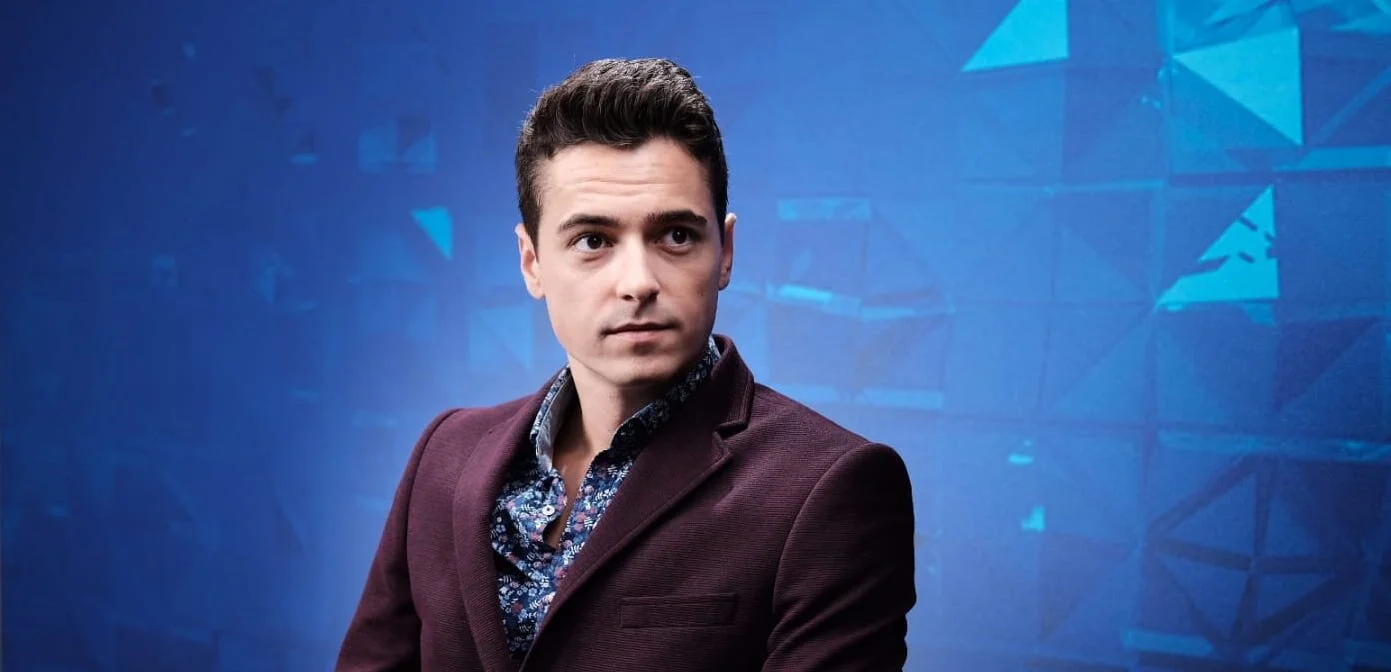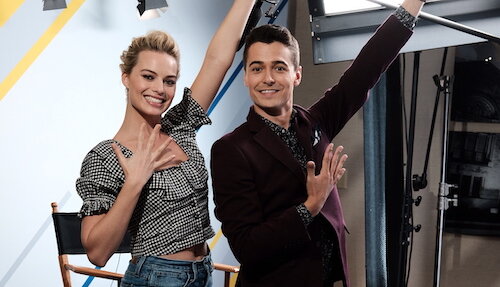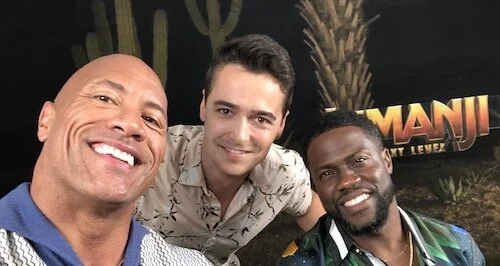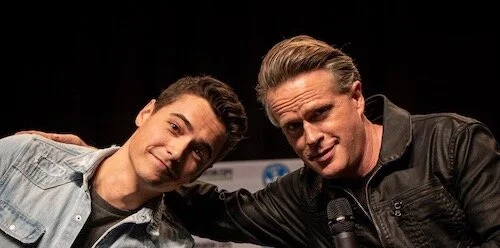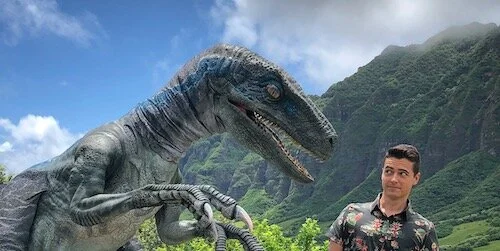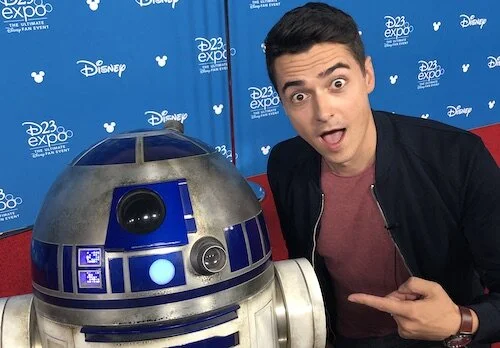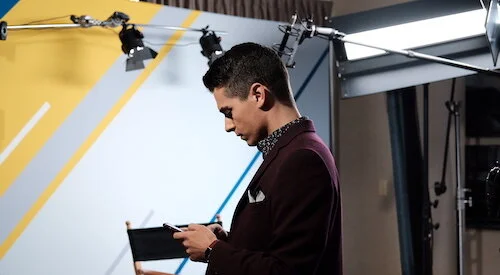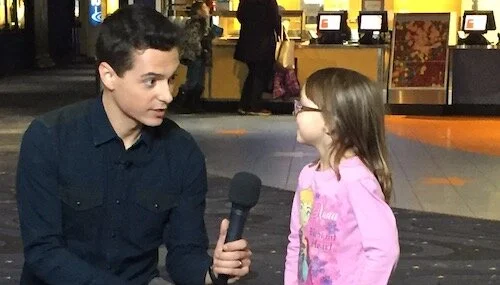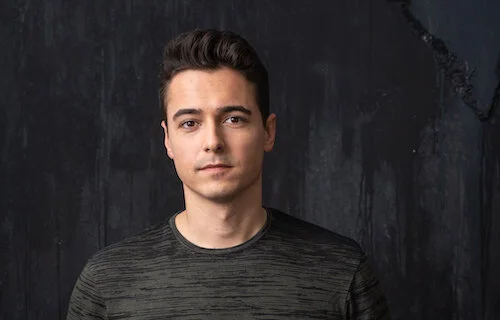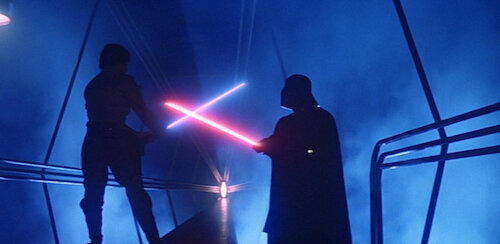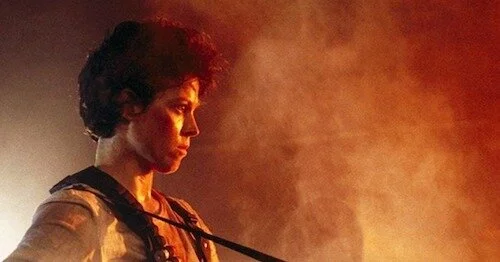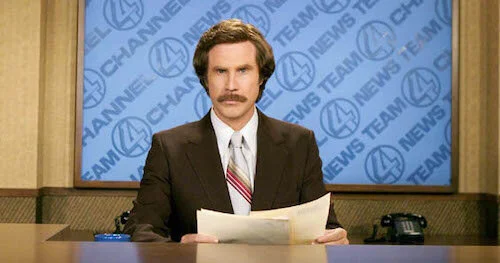Tanner Zipchen: All About Film and its Many Audiences
Tanner Zipchen is an incredibly familiar face in Canada. Maybe you’ve seen him pop up on a Canadian show, or interview your favourite film stars to promote their latest films. His expertise throughout the film industry — as both an employee and a journalist — is unique, because he has a different grasp of the interview process. His approaches to press junkets stands out, thanks to his ability to get along fantastically well with any of his subjects.
Of course, we now know this even first hand, and we’re pleased to state that Tanner Zipchen recently had a discussion about all things movies with us. We conversed about the filmmaking process, the biggest misconceptions about the film going experience, and what magic moments turn us all into the cinephiles that we are. We geeked out about films with him for around an hour, so sit back and enjoy two film lovers gush about their favourite medium. As Tanner Zipchen famously says, “enjoy the show”.
Tanner Zipchen is currently hosting Instagram Live events during the COVID-19 shutdown with many familiar faces (over thirty and counting), so be sure to stay tuned to his Instagram for frequent updates. Past episodes will be uploaded to his YouTube account, found here. He also has a TeePublic store with some snazzy T-shirt designs, and all proceeds go to SPRINT Senior Care and Your Life Counts to help with COVID-19 relief, so grab a shirt or two and support great causes. His official website can be found here, and his IMDb page can be found here.
Films Fatale: As an entrepreneurial journalist, what was the big turning point for you, where you felt you finally hit the stride you were hoping for?
Tanner Zipchen: I think for me, going back, I started in radio. I think it was the moment you kind of branched away from what your program director told you to do, and you took your own direction. For me, there was a segment where I started on my show that coincided with the “Throwback Thursday” trend that was happening on social media. I was starting to bring on guests that I think my audience would have grown up with. So, every Thursday I had a guest on the show. I started with Hal Johnson of Body Break, because he was on The Amazing Race Canada at the time. I reached out to him on Twitter, he came on the show, and after that… since I got Hal on, I was able to put other Canadian people on. Once I got certain other people on, I was able to leverage that for other things.
Just seeing the response and the fans appreciating that (and even hearing it from the guests as well)… it’s also cool now, because I’ve actually stayed friends with some of these people! I actually caught up with some of them recently on Instagram live. People like David Yost from Power Rangers. The original blue ranger. We’ve been in touch ever since that first radio interview. I think that’s kind of a moment where you know you’re doing it. Putting stuff out there that the people generally like and appreciate — even to get positive feedback, I find, is very rare. We live in a world where people share a lot of negative stuff. People go on Twitter and are quick to smash something and bash something. For someone to come out and be like “I like that thing you did!” really does mean a lot, considering. I think that’s also kind of when you know that things are working out.
FF: You brought up the positives outweighing the negatives. During this virus shutdown, I’m personally finding people are trying to promote the positives currently. You brought up the Instagram Live events. That sounds like positivity kicking negativity out the door.
TZ: Yeah! I think it’s also just such a cool opportunity. I talked about it with my wife Kelsey, like “when are we ever going to get this chance again?” to be connected to people in their living rooms. Normally, it’s such a busy industry, where everyone is on a set, traveling, or at an airport. It’s such a cool, unique setting that I can just chat with people while they sit on the floor of their living room, or in their home office. You get these real conversations out of people! It’s like two friends catching up. It’s so real, so genuine. There’s no hair and makeup team. It’s not polished. It’s just raw. It’s uncut and live. I honestly love it! It’s something I’ve never really done before, because even with radio it’s all recorded.
Even with the Comic-Con panels, there’s a lot of “don’t say this or say that” with approved questions. You have to hit the messaging points for whatever the Con needs. This is just no-boundaries, we get to answer some fan questions… it’s really cool. It is so positive. I think it has to do with how everyone is so humbled by this situation. Everyone is in it together. What else can we really do but be positive and try to take peoples’ minds off of things and look forward to this being done? (laughs) Then we can go back to our lives!
Tanner Zipchen with Margot Robbie.
FF: I’m so glad you brought this all up. You get it! You’re not here with an angle, or to come up with something. You’re a fellow film geek wanting to geek out with people in the industry who themselves want to geek out sometimes! They don’t just want to promote stuff. They also want to celebrate film!
TZ: To have real conversations without an agenda! I’ve been on the other side of that, where I’ve done interviews with people interviewing me, and there was an agenda. There was something that they want, and no matter what you say, they will just edit out pieces of this, pieces of that, to complete their mission for clicks on their website, or whatever it is. I don’t have an agenda going into these things. My agenda’s just to have fun for fifteen or twenty minutes. We’ll take the conversation where we’ve got to take it. If there is a project we should highlight, then definitely! There’s been some great ones lately, like Robin Lord Taylor was just on about a week ago. He’s teaming up with Shields for Heroes: a company in New York helping to give [personal protective equipment] to first responders and first line workers. They’re now expanding to give to more people. Stuff like that, we’ll definitely talk about. Other than that? There’s no agenda. There’s no criteria. We’re just hanging out!
FF: That’s exactly how it should be. Yes, at the end of the day, we’re promoting a product, site or service, but isn’t it also about discovering more about the guest and what they are all about? It’s always confused me when a CNN or similar news reporter has asked someone in the film industry about a political crisis or something they’re not experts on.
TZ: That’s how I always have approached interviews throughout my career. There’s only been a couple of times where I’ve literally had questions written for me. That was a very short lived period (I think one or two interviews). It went back to me basically. I research everything I need to research. I do a lot of reading beforehand. I am prepared to take the conversation any way it can go. That’s the great thing! You do make these discoveries. If you’re not restricted to a bunch of questions on a sheet, we can talk about anything. I’ve learned so many things about so many of these people that I never knew before! With Finn Wolfhard, Team America was one of his first R-rated movies [he ever watched]. Ben Mulroney loves Ace Ventura. There’s things you would never come across having a structured bunch of questions, unless you ask the specific, right questions and happen to hit it. That’s what I love about it! Discovering new things, and going places that maybe nobody has ever gone before. I feel that’s a Star Trek line, isn’t it?
FF: Actually Star Trek is one of the few things I don’t really know about, so your guess is as good as mine! (laughs)
TZ: (laughs) Yeah!
FF: As someone interested in acting and actual film production, what valuable lessons have these experiences brought to your interviews?
TZ: I think there’s the understanding of [the film industry]. Understanding the process is a big one. That’s something I learned a lot about over the years. Coming from the film side, whether it’s critiquing or reviewing a film, people will look at something and go “That was a bad movie,” or “Bad acting.” Was it bad acting? Maybe the actor did everything they could have possibly done with that script. Maybe it was bad writing, or maybe the direction was terrible. We weren’t seeing what we were supposed to see. I’ve learned to understand it more. With understanding it, you know what goes into it. You watch these films, and you understand them. You’ll go “Wow! They pulled off that long one-er!” [writer’s note: “one-er” refers to a single long shot] You wonder how long that takes, or how many takes that would take to nail. I was on the set of The Suicide Squad [writer's note: James Gunn's upcoming sequel to the 2016 film] a couple of months back in the fall in Atlanta, and they were rolling on take thirty three of this long one-er, where each character had to come in and basically deliver a line.
People don’t realize when they launch it how long that takes, or how perfect everything has to be for that moment to be captured. You really have a new appreciation for film as well. You go to approach it, discuss it and analyze it, and you can dig into it in a realistic way. I think some people don’t have that understanding, because I've heard a lot of unfair criticisms about things in the past. Also having friends that are directors with a movie coming out, and seeing how they're not happy, because it’s not the film they wanted to make. You realize on top of that, you have studios, you have producers that are overriding your decisions. Let’s not go blame the director if the movie was bad. There are a plethora of obstacles that one must go through to make a movie. Just being respectful of that, and respecting the time that goes into it… the big one for me is just that. Earning and gaining that respect for what goes into making the stuff that we watch. All the lives, and all the hours of time. You watch the credits and see all of those names. Those are all people that were away from their families and working long hours, maybe working nights… to make that thing that you’re gonna watch and go… “Meh! Wasn't for me! One star!” (laughs) You’ve gotta think of the people too!
Tanner Zipchen with Dwayne “The Rock” Johnson and Kevin Hart.
FF: (laughs) As a critic myself, I feel very guilty about this sometimes.
TZ: No one really tries to make a bad movie. That’s the thing. You know when that crew made that movie, and the cast, they gave it their all. Maybe there was some studio head that decided at the last second in the editing room “We're going to make it a musical!” So they added all of these weird songs to it. Now the whole thing became some kind of an abomination. That’s not the fault of anyone else. Everyone did the best work they could do. That’s the thing to remember too. Even Tommy Wiseau tried to make a good movie.
FF: He certainly did with different cameras! (laughs)
TZ: (laughs)
FF: I needn’t say more. You clearly know the history of The Room inside and out if even that alone elicited a reaction. It sounds like people come to you after seeing a bad film and ask you personally “whose fault is this?” It will be a different context every single time, because of all of the hands at work. I think performers and directors get blamed the most because it’s their names and faces. It’s unjust.
TZ: Anytime you’re the face of something, that’s it. I’ve dealt with that over the years. Once you’re the face of something, you take the brunt of the responsibility. Even though someone else wrote those lines for you, or the music they put to [the shot] was weird and took the comedy out of the piece, you’re taking the fall for it. “You’re not funny!” Well, no. It was delivered in a funny way, but they put the wrong score on it. They cut it weird. They didn’t create that beat for the joke to land. There’s a lot of things that can get in the way of a great performance, or ruin a perfectly good performance as well!
FF: When you’re on the set of a comedy, the scene might have been hilarious on set. To convey that in a cinematic sense… there are so many transitions between the script and the final edited product. It’s something that I feel a lot of people take for granted.
TZ: Also it goes the other way, too. Things can improve in the editing room. I’ve been in situations — even in interviews — where I felt “that wasn’t really funny”. Then you watch it back, and it’s actually pretty hilarious. Some things work differently on camera. You can improve things as much as you can take away. It’s really about understanding how it all comes together. Even the fact that someone’s asking you “whose fault is that?” shows more of an understanding than the average person who’s taking things at face value.
Tanner Zipchen with Cary Elwes.
FF: You’ve clearly expressed that film is something you’ve been fascinated by for most of your life. What interested you so much about film from such a young age? What was the starting point of this journey for you?
TZ: It’s kind of a twofold thing. One, I just had this desire to perform. I loved being able to say things or write things to make people feel something, laugh or react. It’s such a cool thing. Wanting to be an actor, I also wanted to learn more about everything. I think whatever you do, whatever craft you work in, it’s good to understand all the multiple angles of it, and all the facets of that industry. Get a full wrap around. As an actor, you should understand what it’s like to direct, how things work and how things are shot… Every time I’m on a set, I’m asking a million questions to everybody! “What kind of mic is that?” “How does that work?” “How does this work?” I try to collect as much information as I can. I think that grows your skillset.
For me, what really got me into film and peaked my interest… as a kid, I went through a dinosaur phase, which quickly brought me to finding Jurassic Park. I believe I watched it at a drive-in theatre. I love drive-ins! I’ve read all the articles saying this could be the comeback year for drive-ins!
FF: Yes!
TZ: It was seeing these dinosaurs, and then going out to Drumheller, Alberta, going to the museums there, then [wondering] “How did they make these dinosaurs look so cool?”. Then it’s realizing there’s this company run by Stan Winston, and he makes all these movie dinosaurs! Then it’s [wondering] how they work with the animatronics. That then got me into the behind-the-scenes stuff by breaking things apart, then films like Star Wars came about. It was Jurassic Park that got me into wanting to know more about the behind-the-scenes of movie making and how things are made. It was cool to see! “So they make this dinosaur in a studio somewhere… that guy does that… over here, this actor’s doing this. This costume person’s doing that.” It all comes together, and they make this amazing movie. Then they put some rain on it, cool music, and then boom! You’ve got Jurassic Park! It was just so cool to see it all come together. I said I want to be a part of that someday. I want to be able to be one of those people: a little cog in that big wheel to make something like that myself. That’s what really drew me to it.
FF: It seems like such a perfect film in this case. I grew up with that dinosaur phase as well.
TZ: Everyone did!
FF: I’m still going through that phase! My favourite [basketball] team is the [Toronto] Raptors. It’s a coincidence, but it helps.
TZ: I’ve got a whole bunch of Raptors stuff at home! Being a Saskatchewan boy, I’ve got a lot of Raptors stuff just because I loved the logo. It’s so cool! It’s a raptor holding a basketball. I was like “This is great! Love it!”
FF: There you go! I’d argue today that ninety percent of the effects in Jurassic Park still hold up.
TZ: True!
Tanner Zipchen with what we can only guess is a real life velociraptor.
FF: Since you were wondering how the film was made, it’s important that it was that well-made film, since it set you down this path in the right direction.
TZ: It speaks to the film as well, those effects. You can watch the film today and it does still hold up. I’ve watched movies that were made half that distance back, that have already been severely dated. If you go watch I Am Legend… I still don’t understand why (with all of the effort) they couldn’t have real people in makeup. You watch The Walking Dead, which is a made-for-TV series, and look at the things they’ve accomplished. You really couldn’t have put someone in makeup? You had to do the weird CG thing? The mouths don’t even look real. They’re moving and are disjointed in a weird way! It takes you completely out of the film. You look at something like Jurassic Park, and it’s a little more work and definitely challenging to take an animatronic and throw it outside and dump gallons of rain on it, and watch it malfunction a bunch of times and towel it off. There are those challenges. In the end, you get a product that is timeless! For me as a kid, that’s what made it feel so real.
Watching Gremlins, and there was an actual mogwai. It’s a tangible thing. It feels real. The old Star Wars cantina scenes! I love those practical effects. That’s why, even now, I have such an appreciation for companies like Weta Workshop and the work that they do. Some of the stuff they do now is so amazing, it almost looks CG! For the opening of Ghost in the Shell, they actually built that exoskeleton to actually come apart into pieces to be rebuilt. It’s all practical! When you watch the opening, because of the filter they put on that shot, it looks CG. It’s funny, when I was talking to Richard Taylor [of Weta Workshop] about it, he rolled his eyes and said “That’s the problem when you do something too good!” I guess people think it’s fake! (laughs)
FF: That uncanny valley is prevalent nowadays! I swore BB-8 [from the latest Star Wars trilogy] was CGI. Nope! They built one!
TZ: Yes! It’s a real thing. It does speak to how far visual effects have come over the years. That line’s now blurred. There was a time where it was very obvious when something wasn't real. There’s a recent film with Harrison Ford and a saint Bernard [The Call of the Wild]. I’ve read stories about that online. I guess you could shoot a lot quicker not having to train a dog, or multiple dogs. When it comes to a project like that, you’re going to need a lot. Every dog can only learn a few tricks for the camera. You’re going to need a busload of dogs. I guess it is a more efficient way [to shoot the movie], but you end up sacrificing the quality. Plus, the whole animal cruelty thing. [Using CGI rendered dogs are] a positive there. It’s so sad now watching Homeward Bound or The Swiss Family Robinson movies, and then Google stories from the behind-the-scenes… you’ll go “I can’t believe I liked that movie.” Those poor animals.
FF: That’s something I’m not comfortable with either. In arthouse films, the treatment of animals can get much worse. That’s a tricky subject for another day of course!
TZ: Yep! Another day! Moving on!
FF: It sounds like you’d be in agreement with me on this. If I said the ‘80s and ‘90s were the best eras when it comes to practical effects (right before CGI really took off). I watch films like Blade Runner and Brazil, and I still don’t understand how some of these films were shot. This was a crazy time when it comes to effects!
TZ: The use of miniatures and all of that. It was awesome. Even if you could tell it wasn’t Arnold Schwarzenegger’s face being pulled apart, it still looked cool. Your mind still knows. Your eyes and your brain still know when it’s something real that you’re watching. It’s not something that was fabricated with software. There’s something so cool about that. The ‘80s and ‘90s did this so well. There’s stuff that you’d watch back now that they wouldn’t even pull off now. Talking about the animal scenarios and CG’ing them to avoid using real animals and putting them in these situations… even back then, there are stunts they wouldn’t even try now! To think that they put actors in those situations and did those things. Now, [producers] would say “Well, let’s not drop a motorcycle off a parking garage. We’ll just CG that later!”
Tanner Zipchen with R2-D2.
FF: I always think of the Aqaba sequence in Lawrence of Arabia, which is one of my favourite directed scenes ever. David Lean had literally hundreds of people on countless horses and camels barging into a city. They would never do that now! They would CG everyone!
TZ: No, that’s exactly it! For a good reason. Budgets aside, safety is another big thing. Safety is paramount. There are things we can’t get away with anymore. It is interesting going back to watch these older films. You’d go “That would be a very tricky day on set!”
FF: No kidding!
TZ: (laughs)
FF: You not only talk to familiar faces, but you convey cinema to the masses on an understandable level. What do you hope to bring to the common film going public when it comes to describing the best of film?
TZ: For me it’s about knowing your audience. It’s something I’ve learned a lot about over the years, especially starting in radio and bouncing around between different formats. I’ve worked with some really talented program directors that have taught me a lot. If you’re talking about a certain topic, let’s say Star Wars is hitting theatres, and you’re talking about it on a top 40 station versus a rock station versus a country station versus a news station… you’re having a different approach on every one of those. That’s something for me, especially when bouncing between formats, you have to learn to modify that as you go.
Say you’re on a pop station and the key demographic is thirty five to forty five female, or the rock station is forty plus male, and you’re talking about Star Wars… you lean into different things. That audience wants to hear more about this or less about that. For me, it’s understanding who you’re talking to, what they’re interested in, and then really speaking to that. You’re not losing anybody. There’s a new Jurassic World movie. You might say “it’s a continuation of this whole saga, we’re going to see the cast of the original Jurassic Park film and it’s really cool!” If you’re a cinephile or Jurassic Park fan, you care that Laura Dern is returning. For some people, all it is is “dinosaurs… and Chris Pratt!” Sold!
FF: (laughs) That’s it!
TZ: That’s really it! You can literally have a poster that just says “Dinosaurs and Chris Pratt”, and you would sell a fair amount of tickets! You’ve just got to know who you’re talking to. That’s the thing with the Comic Con crowds. I’ve spoken at a We Day, which is a bunch of youths from different schools around a particular city or province, around eight thousand kids in an arena with different interest levels. Then you have a Comic Con, with something like a Star Trek panel, where everyone there has watched every episode of this show. They know it inside and out, and all the minutiae. You can speak at different levels of detail. It’s knowing who you’re talking to and reaching them on their level. That’s the key, too. You want to feel like you’re not talking at people. My mentality — back to the radio days — is to feel like you’re talking with somebody, not at them. Try to avoid being too overly preachy, or too informative. You’re that friend telling them what cool thing they should check out. (laughs)
Tanner Zipchen at one of his many workspaces.
FF: As a comic con veteran at this point, how do you feel about the current discussion between certain franchises and cinema as a whole? Is there foundation? Is it petty?
TZ: As in people debating the quality being decreased?
FF: Yes.
TZ: I see. It’s interesting. I just spoke with Anthony Daniels [C-3PO] on an Instagram Live, and his favourite Star Wars film was A New Hope, because it started it all. We both agreed that it is a very complete film. It’s the total space western. Honestly, if that was the one and only film, it would work. It’s complete. It’s the classic hero’s story. A hero with an unknown background or origin finds a mentor to discover and defeat the evil overlord, and saves the princess. It’s the age old hero arc. We went on and saw sequels, prequels, even talking about The Mandalorian and Baby Yoda. I believe [Daniels’] response was that he laughed, rolled his eyes and said “Next question.” (laughs) The original film might have been made with something different in mind. It might have been made to tell this story that’s never been told before. As we saw the success of things, the action figures sales, and lunch boxes, and happy meal toys, and posters, and T-shirts, and theme park rides… The idea of this franchise and brand does change things. It does interfere with certain decision making.
The last three Star Wars films… as a fan, I personally would have loved to see them revisit the old planets rather than go to new ones. Let’s go back and see the Ewoks again. If we’re going to ride a creature, let’s ride a Tauntaun! Let’s bring that back! But it’s always new characters and new planets, because that expands the universe. That’s more toys, and more potential to grow something. I think that does factor in a lot. I’ve seen those debates of quality over quantity, where [studios] are trying to pump out as many things and heroes as they can. Overall, the arc is the same. It’s that original arc I was saying: a hero of unknown origins finds their powers, defeats the evil whatever, and saves the day. That’s kind of every single superhero movie we’ve seen in the last ten years, give or take a few. It’s interesting. I personally haven’t loved some of those movies as much as others have. I’ve seen people go to the theatres and say “You have to see this film! It’s so amazing!” They're talking about this superhero film. I’ve gone and thought “Eh, it was okay.” They've replaced the armoured suits and put on a different suit, and it’s kind of the same movie. Do we ever go into those movies and wonder “What if they don’t win this one?” (laughs) Can you imagine if The Avengers: Endgame ended, and that was it? Everyone’s dead? Jeez!
FF: After three hours and however many films, I think audiences would be furious!
TZ: Can you imagine? Like, “Oh jeez, poor Captain America. Wished there was more for him, because he didn't make it.” (laughs) We kind of know how they're going to all go. That is the fun of it, though. As you say, it’s more of a ride and an experience. It’s a very different type of a film than what we’re seeing nominated for Oscars. It’s all preference. Some people don't want that. Some people don’t want complicated. We live complicated lives. We have problems. Do we want to think more? Do we want to go watch a movie and turn our brains off? Have fun and laugh at jokes. That’s it. They go home and wear a T-shirt because it's cool.
Tanner Zipchen interviewing an upcoming movie buff.
FF: All audiences are different.
TZ: It’s all different philosophies and opinions. I don’t think there’s a right one or a wrong one. I know people who like both. Sometimes I’ll want to watch something that's simpler. If I want to really think, I'll put on some docu-series or some HBO series that's going to totally blow my mind. Sometimes I want to put on Letterkenny, or watch reruns of That ‘70s Show. It’s good fun. Apples and oranges.
FF: You represent a side of the Canadian film industry as a representative to the masses, a journalist, and an artist. What do you think people should know about the Canadian film industry that they might be missing or misunderstanding? Pros? Cons?
TZ: This is something I’ve recently was starting to dissect and look at, especially when the nominations for the Canadian Screen Awards came out. I’m working now with Made, which is a great company here in Canada, that works with the Canadian Media Fund. They do a lot to promote Canadian content. It’s a huge passion of mine, which is why we found each other and are now making beautiful work together, videos and things. Going into the Canadian Screen Awards, which I was supposed to be on the red carpet for… unfortunately when that got cancelled, things changed. Looking at the nomination list as I was preparing for what was potentially hundreds of interviews on the red carpet, I noticed something.
My wife and I both noticed it. You take a look at the list of Canadian films nominated, and you look at the Canadian TV shows nominated, and there was this massive discrepancy. With the Canadian TV series, with every nominee you had either watched the show or you could name somebody from the show, you could name a character from the show… They were all familiar shows. You know, Schitt’s Creek, Letterkenny, Working Moms. On the films side, there was this list of films where — and as someone myself who has seen many films and has maybe dug deeper than most — I had only watched one of those movies, and that was because it was at TIFF last fall. I noticed there was this weird imbalance of looking at the film nominees with no familiarity with any of them, besides maybe one or two. Yet on the TV side, we know all of them. Why is that? Why do we know the TV better than the film? Why aren't those films getting brought to people? Why aren’t people seeing those movies?
FF: From my little experience with researching Canadian films, it seems like Canadian films are a bit of a mutt between worldwide arthouse rebellious statements being made (especially Quebecois films). The films are anti conformity. I feel the television shows fall along the BBC or British way of going about things: the short series or the long, familiar series. With shows that have made it big in the states like Schitt’s Creek and Orphan Black, there’s now an even bigger shift. The television side is more conventional.
TZ: That’s true.
FF: On the film side, you have past Canadian Screen Awards winners like David Cronenberg’s Dead Ringers, and Naked Lunch. Polytechnique and Incendies by Denis Villeneuve. These winners are very challenging, arthouse, or borderline experimental films to say the least.
TZ: Definitely true, especially for those lists of nominees. At the same time, I’ve been in situations, like when a friend of mine directed a horror film here in Canada. He had a premiere and a Q&A at a theatre in downtown Toronto. There was really nobody there. It wasn’t promoted or advertised by the theatre. I think it’s a matter of selling tickets, or whatever it may be. I think the Canadian films unfortunately don’t get the attention they deserve. It is unfortunate to see. I have a lot of friends that put a lot of heart and soul into a movie that gets one screen for two days. That’s it. You go to a threatre and Aquaman is on eleven of the twelve screens! (laughs)
Tanner Zipchen.
FF: Including AVX, Imax, and regular screens!
TZ: Coming from Saskatoon, in Toronto we have more options to see movies. Even talking about Booksmart [writer’s note: we discuss the 2019 comedy Booksmart later on in the interview in great depth], that's a film only shown in a few theatres in Toronto, because it wasn't of mass appeal, depending on how theatres rank it or gauge it. At least there were options to see it. Coming from Saskatoon, if it's not in the big theatres, because Aquaman is on eleven of the twelve screens, and unless it’s shown at the Roxy theatre] [writer’s note: this is an independent theatre in Saskatoon]… They have two screens. Unless they pick it up, it’s not even showing in that city, which really means not even in that province. People in that entire province don't know of this movie. When it hits Amazon Prime where it is now, they may not check it out, because they’ve never heard of it before. It’s a matter of getting these movies to people, which I think is cool now. It’s interesting with the streaming platforms, there are people discovering more things. It’s the great equalizer. People are now going on Amazon Prime and maybe digging a little deeper. Hopefully they are finding these projects, and works by great Canadians. I think now’s the time to dig around and not pick out of what you’ve been given. Know what I mean?
FF: In Toronto, films like Booksmart and Annihilation which were shoved to streaming quickly still sold like hotcakes. There are still audiences like you and me who want to go to the theatres to see these films.
TZ: I think there’s this misconception that we think if something is big or popular, it means it's good. (laughs) That’s not always the case! I think that's also why people find something they love on a streaming platform. A lot of people go into those selections open minded. They scroll through Netflix, you’re getting a recommendation of some show or movie you’ve never really heard of, and you take a chance on it. You’re going in not having seen a bunch of trailers, not having read reviews, not having watched the late night circuit of interviews. You’re going in pretty open minded. You don’t have an opinion already. I find that’s a huge factor on whether you would like or dislike something. You have a benchmark already. If you’re told that’s the funniest movie of all time and it’s in your head, you’re imagining your definition of what that is. That movie might not hit that. Or, if you go in the opposite, thinking it’s the worst movie of all time, and you go in thinking one thing, you might end up loving it. For me, when I’m scrolling through, I’m going in open minded. I feel like I’m giving the film a fair and honest evaluation. I end up loving most of the stuff that I watch, because I don’t have any other voices in my head telling me otherwise.
FF: We like to send interviews off with the most basic question, based on why we are all cinephiles. What are your top films of all time, and why?
TZ: That’s tough! I’ve changed so many times over the years.
Jurassic Park
TZ: As a kid I loved Jurassic Park. Got all the toys…
Star Wars: The Empire Strikes Back
TZ: Things changed, and Star Wars was big for me. That original trilogy. When they were re-released in theatres, I saw The Empire Strikes Back. I was trying to go see The Return of the Jedi, but it was sold out. We saw Empire, which ended up being a happy accident, as Bob Ross likes to say. Even to this day, people say Empire might be the best of the original trilogy. You can’t beat it, especially on that old format which I’ve never been able to see before until that point.
Labyrinth
TZ: Then Labyrinth came about, and that kind of era… Dark Crystal, or more-so on the Labyrinth side. It was a captivating era. Anything that took you to a new world and transported you somewhere else. I love that, especially again with the practical effects.
Alien/Aliens
TZ: Then I got to horror and sci-fi which got me into movies like Alien. Alien was such a horror movie in space, but then Aliens leaned into that action movie. They’re very different films! It’s interesting to see a sequel that’s a completely different genre, almost, as the film it follows.
Tremors/Short Circuit/Gremlins
TZ: With that came Tremors, with the Graboids and Kevin Bacon. Then Short Circuit and Gremlins were in that phase for me.
Jim Carrey ‘90s Films
TZ: And then I fell into comedies after that. Jim Carrey was a big one for me. Anything like The Mask, Ace Ventura… even the second one! When Nature Calls! It’s not bad. There’s some good moments. The Truman Show, and Dumb & Dumber.
Anchorman
TZ: Anchorman was one for me later on in high school. I loved Anchorman and Will Ferrell. That was the peak of his career. Coming out of Old School and going into Anchorman. I could quote all of it. I can maybe quote all of it still if I put it back on.
Blindspotting
TZ: There’s been so many films… I’ve seen so many movies in the last few years. One that really stands out is Blindspotting. I thought it was unique and amazing.
Booksmart
TZ: And Booksmart. Olivia Wilde’s film. I thought it was so fresh. The soundtrack’s amazing. It feels almost like you’re a fly on the wall of these two kids’ homes the night before graduation. It feels so real, which I think is really hard to capture. It’s also so beautifully done. With her work with music videos going into that, I know she’s done a bunch including with The Red Hot Chilli Peppers. She brought that to the film, which is cool. It’s rare to see a film that’s so funny and a comedy, and yet it’s so beautifully shot. It’s probably the most beautifully done comedy that we’ve seen. Normally when you’re laughing that hard at a movie, it’s not shot anything like that. (laughs)
FF: Like that long take with Kaitlyn Dever and Beanie Feldstein fighting, which revolves around them. For a film that’s as raunchy and funny as it is, Booksmart is also inventive and well shot. It’s so aesthetic. Superbad, which is also really funny, doesn’t look like this.
TZ: I just watched Good Boys recently. It’s shot how you think it would be shot. That comedy style. Any of those comedic films have a certain style that goes with it. With Booksmart, they really mashed two things together. It really works. The soundtrack, too, because they opted for this somewhat unfamiliar [tracklist]. [Olivia Wilde] is such a great curator of songs. They put this great list together. It’s somewhat unfamiliar, but the songs are really good at capturing the moods of those scenes. It really helps emphasize so many things. Overall, Olivia did an amazing job.
We thank Tanner Zipchen for chatting with us today! Be sure to check out his official website, IMDb, Twitter, YouTube and Facebook. Follow his Instagram account for his Instagram Live interviews, and be sure to pick up a T-shirt from his TeePublic page to help support SPRINT Senior Care and Your Life Counts.
Andreas Babiolakis has a Masters degree in Film and Photography Preservation and Collections Management from Ryerson University, as well as a Bachelors degree in Cinema Studies from York University. His favourite times of year are the Criterion Collection flash sales and the annual Toronto International Film Festival.

